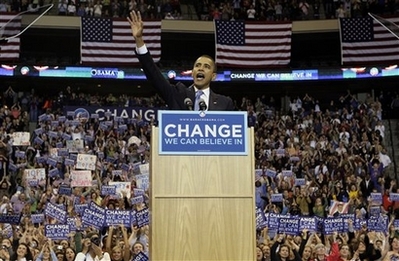McCain, Obama plunge into 5-month general election
(Agencies)
Updated: 2008-06-04 19:34
Updated: 2008-06-04 19:34
WASHINGTON - Change is coming, that much Sens. John McCain and Barack Obama agree on as they plunge into a five-month campaign for the White House.
 Democratic presidential hopeful, Sen. Barack Obama D-Ill., waves at a election night rally in St. Paul, Minn., Tuesday, June 3, 2008. [Agencies] |
The primaries behind them, the presidential rivals were wasting no time drawing the battle line for a fall fight that will make history with the election of either the oldest first-term president in McCain or the first black leader in Obama. In speeches marking the start of the general election, both maneuvered for the advantage with voters sour on the status quo.
McCain, a four-term Arizona senator seeking to succeed a fellow Republican, uttered the word "change" more than 30 times as he tried to distance himself from President Bush and blister his Democratic rival. Obama uttered the phrase 19 times in a speech that claimed the Democratic presidential nomination.
"The wrong change looks not to the future but to the past for solutions that have failed us before and will surely fail us again," McCain, 71, said in suburban New Orleans. "I have a few years on my opponent, so I am surprised that a young man has bought into so many failed ideas."
In St. Paul, Minn., Obama, 46 and a first-term Illinois senator, ceded no ground on the reformer mantle and cast McCain as a continuation of the unpopular Bush's eight-year tenure.
"My differences with him are not personal; they are with the policies he has proposed in this campaign. Because while John McCain can legitimately tout moments of independence from his party in the past, such independence has not been the hallmark of his presidential campaign," Obama said.
The campaign is the first in half a century in which neither a sitting president nor a vice president is running for the highest office, and the first since 1960 in which a senator will assume the White House. A fragile economy and an ongoing Iraq war, as well as matters of age and race serve as a backdrop.
Both McCain and Obama were full of praise for defeated Democratic candidate Hillary Rodham Clinton as the two sought to make a play for her loyalist backers - women and working-class voters.
Clinton, the New York senator and former first lady, stopped short of dropping out of the race even though Obama had reached the requisite delegate count for the Democratic Party's nomination. Instead of conceding, Clinton said she would spend the next few days determining "how to move forward with the best interests of our country and our party guiding my way."
Behind the scenes, she maneuvered for the vice presidential spot on Obama's fall ticket, expressing a willingness in a conference call with her state's congressional delegation. "I am open to it" if it would help the party's prospects in November, Clinton replied, according to participants who spoke on condition of anonymity because the call was private. Obama's aides were noncommittal.
In the meantime, the party was swinging behind him.
"We have come to the end of an exciting primary and caucus process - the voters have spoken," four top party leaders said in a joint statement issued early Wednesday.
"Democrats must now turn our full attention to the general election," they continued. "To that end, we are urging all remaining uncommitted super delegates to make their decisions known by Friday of this week so that our party can stand united and begin our march toward reversing the eight years of failed Bush/McCain policies that have weakened our country."
|
||
|
||
|
|
|
|

